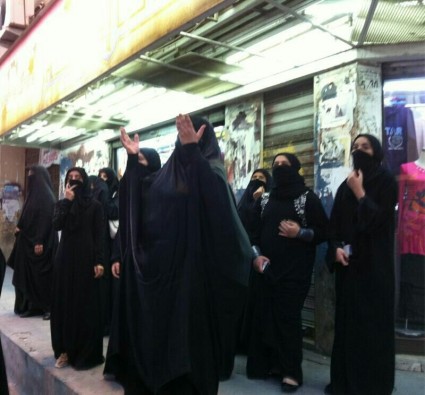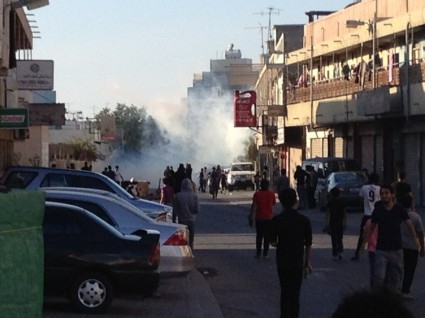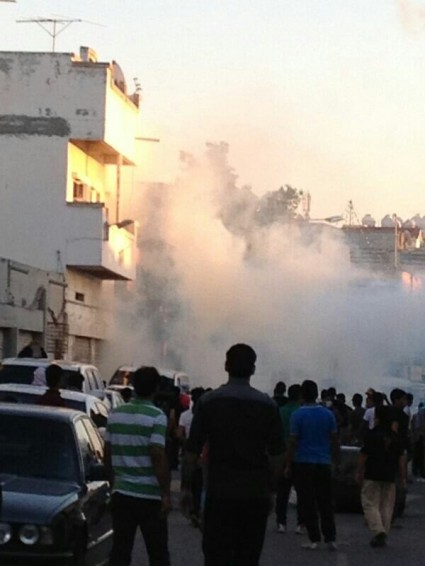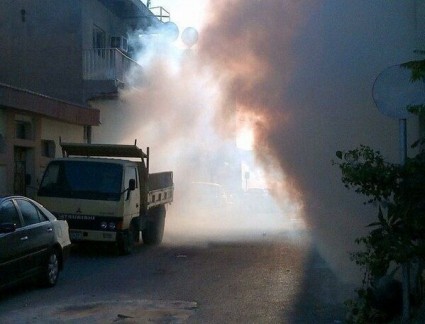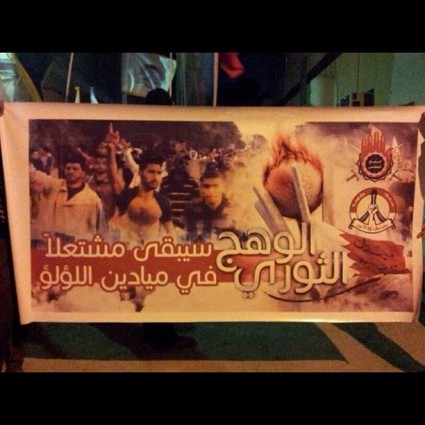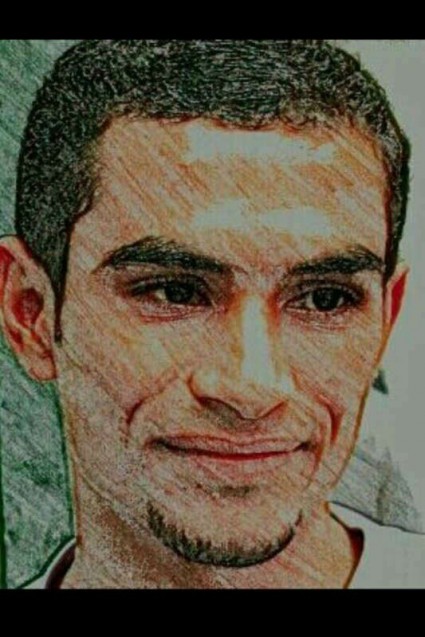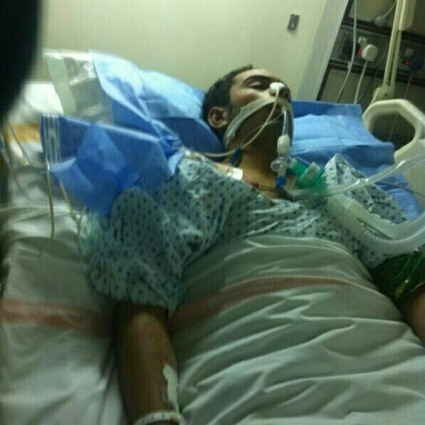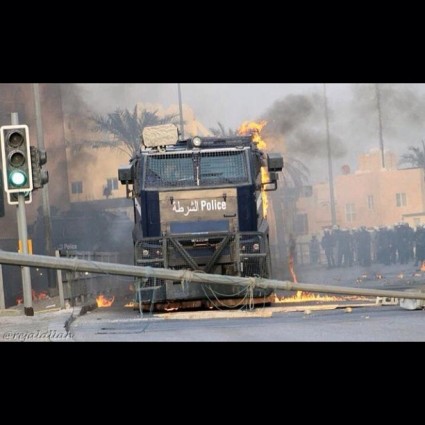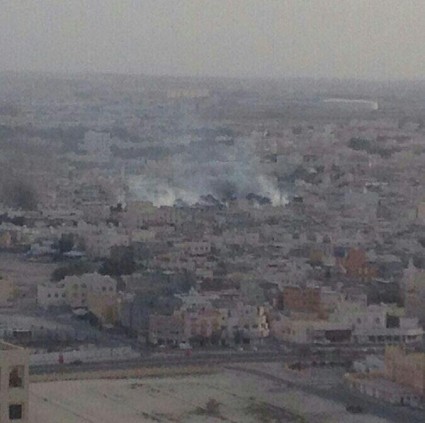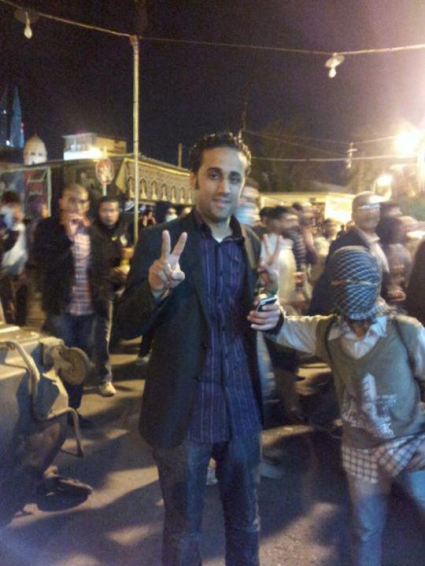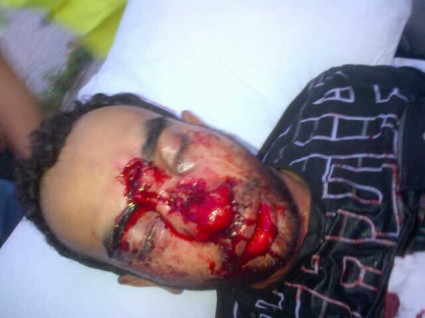Posts from — February 2013
Insult to Injury – UK dishonors its own and those martyred under its failed policies in Bahrain
A Sandhurst tribute to the fallen of a First World War battle has been abandoned so a donation from the King of Bahrain can be honoured.
Row over renaming of Sandhurst hall after Bahrain donation
UK Telegraph – By Tom Whitehead, Security Editor – 17 February, 2013
Mons Hall, named after the 1914 battle that saw thousands killed, will be renamed the King Hamad Hall after he gave £3 million towards its refurbishment.
Defence chiefs were accused of betraying the memory of soldiers who gave their lives for their country.
MPs also questioned the ethics of honouring regimes that have dubious human rights records.
It emerged an accommodation block at the Army officer training academy has also been named after the first president of the United Arab Emirates (UAE) following a £15 million donation from the country.
Andy Slaughter, Labour’s chairman of the Democracy In Bahrain all-party parliamentary group, said: “To change the name of something which commemorates a very tragic episode in British military history and an example of courage and heroism of British soldiers simply because they’re getting a sum of money from a rather dubious source is appalling.
“It reflects the appalling double standards the British Government and institutions have in relation to the Bahraini regime, which is guilty of all sorts of human rights abuses and fundamentally undemocratic.”
The Battle of Mons was the first major action of the British Expeditionary Force in the First World War.
Facing overwhelming odds from a far larger German force, more than 1,600 British soldiers were killed along with more than 5,000 Germans.
It gave its name to a sports hall at Sandhurst but the title will now be dropped when it is reopened next month following a refit.
King Hamad, who is Patron of the Sandhurst Foundation – a forum for former officer cadets – has been invited to the reopening but is still to make a decision. …more
February 22, 2013 No Comments
Of Freedom and Remembrance – Abdulredha Buhmaid and The Martyrs, Nabeel Rajab and The Prisoners
Riot police attack Bahrain protest
21 February, 2013 – Al Akhbar
Riot police fired tear gas to disperse hundreds who had gathered in Bahrain’s western coastal town of Malkiya on Thursday to mark the two-year anniversary of the death of a young activist, witnesses reported on Twitter.
Police attacked marchers as they carried Bahraini flags and portraits of Abdulredha Buhmaid who was shot in the head on 19 February 2011 during an anti-government rally in the capital Manama. He succumbed to his wounds two days later.
Protesters in the northern isle of Sitra also held a march to mark the anniversary of the killing where they chanted anti-government slogans.
Separately Thursday evening, activists staged a spontaneous march through downtown Manama demanding the release of jailed rights activist Nabeel Rajab. …source
Rajab before arrest and trial on bogus charges. Sentenced to Prison for Three Years
February 22, 2013 No Comments
The Assassination of 20 Year-Old Mahmood Al-Jazeeri by Bahrain Security Forces
February 22, 2013 No Comments
Bahrain a Country Under Occupation and interview with Jornalist, Sharif Abdel Kouddous
February 22, 2013 No Comments
Bahrain Villages under seige with Chemical Gas attacks on homes
February 21, 2013 No Comments
Foreign-backed Al Khalifa monarchy in the throws of collapse
“…dictatorships cannot remain forever if fully dependent on outside support. The people will eventually bring it down.”
Bahrainis will soon topple foreign-backed Al Khalifa monarchy: Saeed Shahabi
19 February, 2013 – ABNA
(Ahlul Bayt News Agency) – In the background of this the second anniversary of the uprising and continuing revolution that has shaken Bahrain to the core passed this week on 14th February celebrated with mass demonstrations both inside Bahrain and in other countries in solidarity with the People’s demands for democracy and freedom against the ruling dictatorship of the al-Khalifas. Some opposition have entered dialogue with the regime excluding its leadership, while the youth in particular are intent on regime change rather than reform.
An interview with Dr. Saeed Shahabi, a Bahraini exile in London and leader of the Bahrain Freedom Movement about the past and future of Bahrain. Dr. Shahabi has been convicted in absentia, of terrorism, by the al-Khalifa judiciary and sentenced to life in prison.
Q: I’d like you to firstly clear something up because the Bahraini regime accuses you of being quote, “a London-based terror master mind who glorifies acts of terror and sabotage, subverts national security, fuels sectarianism and drives wedges between the nation”. Your response to that?
Shehabi: Is there a tyrant in the world who would not accuse his opponents of such lies. But nobody listens to that. The regime knows that I am not that sort of person and that’s why it has called me many times; sent many people to ask me to go back; he (the king) asked me to meet, the dictator – I met him twice.
So if these attributes really are true why should he sit with a terrorist a mastermind and so on?
Q: Getting back to the week’s events, the protests that have been taking place to commemorate the anniversary and we’re hearing also that a 16 year old boy was killed, heavy security presence… What have you made of this week’s events?
Shehabi: On the 14th of February as we know it was the anniversary of the revolution – two years after the 14th February and the people went ahead with a lot of activism; they went into demonstrations in various parts of the country; they blocked the roads; they called for a national strike… But the response of the regime has been very harsh.
We saw that thousands upon thousands of troops were stationed on that day on various roads in almost every locality. The people found it almost impossible to congregate yet they went out and a 14 year old boy, Hussein al-Jazeery, was martyred.
Q: The opposition or parts of the opposition are actually conducting talks, reconciliation talk with the regime at the moment.
What do you make of that because I know that you’re somebody that believes in regime change rather than reform?
Shehabi: If the regime was reform-able I would have called for reform of the regime. But when we have opposed it for the past 40-45 years – I have, I realized this regime couldn’t be changed and it would be folly for me to just go and ask for a repetition of something that had already been tried and failed.
Q: So you think al-Wefaq are making a mistake by talking to the regime?
Shehabi: I thought al-Wefaq would have been better advised to have stayed away and if they had joined forces on the 14th with the people. Although, they are maintaining that they will keep up the struggle and that is only a way of trying not to be blamed by the Western governments for not joining.
Q: What other route is there to national reconciliation and saving the country other than talks?
Shehabi: Well, it is also a deception to talk about Bahrain in terms of social tensions, there is no social tension except when the regime wanted it to be there.
The problem in Bahrain is between the people and the ruling family, no one else. Of course he introduced and shifted the blame on these social tensions, but in reality he knows before anyone else that there is no such a thing.
…more
February 21, 2013 No Comments
US Puppet Regime in Bahrain under fire for torturing Political Prisoners
Bahraini Political Parties Blast Al-Khalifa Regime for Torturing Activists
19 February, 2013 – FARS
TEHRAN (FNA)- Different Bahraini parties and political groups in a statement lashed out at the al-Khalifa regime for imprisoning and torturing activists, and dismissed the Manama regime’s recent accusations against protestors as baseless.
“The announcement by (Bahraini) security forces on finding a ‘terrorist cell’ is not something new and many similar announcements have been previously made which later came to be known nothing more than baseless accusations as most of the confessions had been taken under torture,” the Lebanese TV channel, al-Manar, quoted the statement as saying.
The Bahraini political groups underlined the need for holding a serious national dialogue in a bid to bring the country out of political impasse after two years and this should be done on the basis of the principle that “people are source of all powers”.
“It is now time the structure of all security apparatuses were reformed and their approaches were changed in a bid to move in line with citizens’ equal rights and respect for human rights … ,” the statement read.
Last week, hundreds of thousands of Bahraini protesters took to the streets in the capital Manama and other cities across the Persian Gulf island to mark the second anniversary of their uprising against the Al-Khalifa regime in February 2011, calling on the country’s rulers to step down.
More than 300,000 protesters poured to the streets across the tiny Persian Gulf island country on Friday in a bid to celebrate the beginning of the third year of their revolution against the al-Khalifa regime which started on February 14, 2011.
The massive population of protesters reiterated their opposition to dictatorship in the tiny Persian Gulf country, and called on the al-Khalifa regime to step down.
The al-Khalifa regime’s security forces killed two protesters during popular protests on Thursday. …more
February 21, 2013 No Comments
The dreadful history of US CIA Rendition and Torture “black sites” comes to light
About Those Black Sites
17 February, 2013 – NYT
A valuable new report issued this month by the Open Society Justice Initiative documents the extent of the Central Intelligence Agency’s use of extraordinary rendition — the practice of abducting suspected terrorists and transferring them to countries with reputations for torturing prisoners during interrogations.
Reporting by The Times and other news media has long established that the C.I.A. operated a secret detention program with “black site” prisons outside the United States. In December, the Senate Intelligence Committee approved a highly critical, classified report on this program that has not been released. Committee members invoked its findings without revealing any useful new information at the recent confirmation hearing for John Brennan, the Obama administration’s top counterterrorism official, who was named to head the C.I.A. But the committee chairwoman, Senator Dianne Feinstein of California, has said that the black sites and coercive techniques were “terrible mistakes.”
According to the Open Society report, 54 countries participated in this program, including many where the rule of law is weak or nonexistent, like Afghanistan, Pakistan, Egypt, Malaysia and Somalia. More surprising and alarming is the collusion of leading democracies. Belgium, Finland and Denmark, among others, allowed their airports and airspace to be used for flights associated with C.I.A. rendition operations. Britain, Italy, Germany and Australia helped interrogate one or more suspects and either allowed or actively aided in their transfers.
The report also contains information about the identities and treatment of 136 suspects who were subjected to C.I.A. detention or rendition. There may be many more individuals caught in this program, but the total number remains unknown. There has been no accountability for the program’s violations of American or international law. President Obama refused to investigate Bush administration officials who bear responsibility for authorizing human rights abuses. He ordered an end to President George W. Bush’s torture policies and the closing of C.I.A. detention facilities, but the Open Society report said Mr. Obama did not repudiate rendition and suggested that some activities could be continuing, including a secret prison in Somalia run with C.I.A. involvement. …more
February 21, 2013 No Comments
Olive Branches in Iran? Ayatollah Ali Khamenei meets with Reformists,Journalists out on bail
Supreme Leader Meets with Reformists, Journalists on Bail
20 February, 2013 – POMED
Iran’s Supreme Leader Ayatollah Ali Khamenei held a meeting with three reformist figures ahead of Iran’s presidential elections in June. This is the first meeting between the Ayatollah and reformists since June 2009 when protests broke out following the last presidential election. The meeting included MP Majid Ansari, Iran’s former Minister of Industry Issac Jahangiri, and former Interior Minister Abdul Wahid Mousavi Lari. In a statement following the meeting, Ansari said “It was a good meeting; we met with the leader and spoke about the general issues of the country.” Al-Monitor reports that “The meeting with the supreme leader comes at the time when political circles are actively preparing a platform for elections, and drawing a map for candidates, whether they are from the ruling conservative or reformist movements.” The paper also notes that sources believe the talks are designed to show an improving political situation in Iran “in order to ensure the largest participation possible in the elections.” Abbas Abdi, a well-known reformist, praised the meeting and called on higher ranking reformists to engage with the government in a similar fashion.
Also in Iran, a prosecutor announced yesterday that Javad Deliri, a journalist recently arrested in a crackdown against foreign media, would be released on bail. He is the third journalist to be released on bail in the past week, joining Fatemeh Sagharchi and Motahareh Sahfii. The three released journalists will return to court for a trial on a date still to be determined. Of the 16 originally arrested, 13 are still in jail. …source
February 21, 2013 No Comments
The Assassination of Ali Ahmed Ibrahim Al-Jaziri, Scenes from a Bahraini Burial
Villager with overcome with grief after Security Murdered Ali Ahmed Ibrahim Al-Jaziri
Scenes from a Bahraini Burial
Sharif Abdel Kouddous – 20 February, 2013 – The Nation
Ali Ahmed Ibrahim Al-Jaziri helps lower his son’s shrouded body into a grave as dozens of mourners crowd around. Many cover their noses and mouths to ward off the sting of tear gas wafting nearby. On the outskirts of the graveyard, hundreds of young men and boys armed with rocks and molotov cocktails are confronted by a phalanx of security forces in full riot gear, backed by armored cars and SUVs. The booms of firing shotguns and tear gas canisters punctuate the buzzing of a police helicopter surveilling the scene below. This is a Bahraini burial.
“I want retribution for my son,” Al-Jaziri says calmly. “We want real accountability, not like what happened with the other martyrs.”
Sixteen year-old Hussein Al-Jaziri was killed on February 14, the day marking the second anniversary of Bahrain’s 2011 uprising. Eyewitnesses told The Nation a police officer shot him twice from a distance of just three or four yards at a street corner in Daih, a village west of the capital. The claims are supported by photographs taken at the morgue showing birdshot wounds clustered tightly together on Hussein’s upper right abdomen—proof of the shooter’s close range. The Bahraini government says it has launched an investigation.
The circumstances of Hussein’s death are especially poignant. On the same date two years earlier, 21 year-old Ali Abdulhadi Mushaima suffered a strikingly similar fate in the same village, where he was fatally shot in the back by police. He would become the first martyr of Bahrain’s uprising; since then, nearly ninety people have killed in Bahrain according to local human rights groups, though some put the number at more than 120, a high toll in a population numbering just 600,000.
A police officer was also killed in the clashes that marked the second anniversary after he was hit with a projectile that fatally injured him, according to the Interior Ministry.
The uprising that began two years ago brought thousands of pro-democracy demonstrators to Pearl Roundabout, in Bahrain’s capital city of Manama. Peaceful protests in the square lasted for a month before they were brutally crushed by the country’s monarchy, with the aid of a Saudi-led Gulf intervention force, as the United States and Europe looked the other way. The Bahraini government tore down the 300-foot monument at the heart of the square, six curved white beams, representing the members of the Gulf Cooperation Council, topped with a cement pearl. Today, protesters scrawl graffiti depicting the monument on village walls as a symbol of an uprising that continues unabated.
“The spirit of the revolution after two years is the same level of force as it was in the beginning, on February 14, 2011,” says Majid Malid, chair of the Manama Municipal Council and a member of the General Secretariat of the Al-Wefaq National Islamic Society, the country’s largest political opposition group. Al-Wefaq has joined five other opposition groups to take part in a National Dialogue called by King Hamad bin Isa AlKhalifa. It is the first attempt at talks in eighteen months and will include the participation of government and pro-government representatives.
Opposition parties say they are pressing for major political reforms, including a constitutional monarchy and an elected prime minister to replace King Hamad’s uncle who has been in power for 42 years. Yet protesters have little trust in the government, especially the youth, many of whom identify with a leaderless yet respected activist group known as the February 14 Coalition.
“The National Dialogue is just a PR stunt to get over the February 14 anniversary,” says Fatima Haji, a doctor of internal medicine who was among dozens of medics arrested and tortured in 2011 after providing treatment to wounded protesters. “How can we have dialogue while they are killing people in the street?”
Since 2011, scores have been arrested and sentenced before military courts, many of them human rights advocates and political opposition figures. Reports of prisoner abuse and torture are widespread.
Under international pressure, the king commissioned an independent inquiry into the treatment of protesters in mid-2011. Last September the United Nations issued a report. But various opposition and human rights groups say the government has yet to implement any key recommendations put forward by either.
While shootings like those of Mushaima and al-Jaziri account for nearly a third of those killed since the uprising began, tear gas is the number one cause of death, according to a report released this month by the Bahrain Center for Human Rights. Many residents speak of the gas as an unavoidable hazard of everyday life. “We’ve been gassed for two years now,” Haji says. “We don’t know what the long term effects are going to be.”
The US-based Physicians for Human Rights has described the Bahraini government’s policy on tear gas as unprecedented in the world, releasing a study last year that found police officers routinely fire volleys of canisters at point-blank range at crowds and into homes and vehicles. …more
February 21, 2013 No Comments
Market hungry military profiteers whose brow is smeared with the blood of the poor
French war on Mali to clinch warplane mega deal
21 February, 2013 – PressTV – By Finian Cunningham
The Rafale has spearheaded the French war on Mali and has been hailed by French President Francois Hollande for its successful air strikes against the impoverished desert African country. Four weeks after the French offensive began in Mali, Hollande flew to India last week in a bid to finalize what is reputedly the biggest military aviation deal in history, centered on the Rafale.”
France’s claim of combating terrorism in Mali does not add up. Re-conquest of this former French colony and control of rich natural resources in West Africa are some of the more plausible reasons for this criminal offensive that began on 11 January.
Yet another plausible reason is to showcase the Rafale, France’s new fighter-bomber.
The Rafale has spearheaded the French war on Mali and has been hailed by French President Francois Hollande for its successful air strikes against the impoverished desert African country. Four weeks after the French offensive began in Mali, Hollande flew to India last week in a bid to finalize what is reputedly the biggest military aviation deal in history, centered on the Rafale.
In other words, the whole war may have been staged to showcase the Rafale with the precise purpose of sealing a deal worth $12-14 billion with India and to fend off a rival tender from Britain’s state-of-the-art Typhoon.
Here’s the background.
Another week, another UN Security Council member comes to India to flog weapons of mass destruction. Just as tensions are boiling between nuclear-powered India and Pakistan over the incendiary Kashmir dispute – soldiers have been killed on both sides in cross-border firefights in recent weeks – along come the leaders of France and Britain to push multi-billion-dollar weapons sales.
Last week, it was French President Francois Hollande who led a delegation of four government ministers and some 60 industrial chiefs to India.
Arriving on 14 February and greeted by Indian Premier Manmohan Singh, French English-language broadcaster France 24 reported the importance of Hollande’s purpose in no uncertain terms: “The two-day visit will be dominated by trade issues, including a $12-billion contract for Rafale fighter jets, dubbed ‘the deal of the century’ in France.”
That deal – still to be finalized, perhaps next year – involves the sale of 126 French-made Rafale fighter-bombers and a potential follow-up of 63 more. It is reckoned to be the biggest-ever military aviation contract between two countries. The bombers are designed to deliver nuclear warheads – a feature that no doubt lends a selling edge on the Indian sub-continent.
This week, however, it was British Prime Minister David Cameron’s turn. Cameron flew to India for a three-day visit to shore up the “special relationship” with Britain’s former colony and past imperial “jewel in the crown.” It was Britain’s biggest overseas trade delegation, according to spokesmen in Downing Street. Accompanying Cameron were four government ministers, nine parliamentarians and representatives of over 100 British industries and businesses, including British Aerospace.
The latter company is particularly relevant since the main objective for Cameron was to dissuade India from finalizing the French fighter jet deal and to award the contract instead to the British-made Eurofighter Typhoon.
“PM in last-ditch bid for India fighter deal,” headlined the Financial Times, which added that Cameron was trying to snatch the contract “from under the nose of French President Francoise Hollande.”
The irony is a little hard to take of UN Security Council members engaged in a dog fight to fuel an arms race between India and Pakistan – the two states, both nuclear powers, have fought four wars since their foundation in 1947. The irony of Britain’s nefarious role is especially bitter. It was Britain’s malevolent partition of India that created the long-running dispute between newly formed India and Pakistan over the mainly Muslim territory of Kashmir. Three of the four wars fought by India and Pakistan have been over Kashmir – that is, as a result of British imperialist meddling. And now Britain is seeking to make billions of dollars from the bellicose tensions that it bequeathed to the region.
To call this a cynical business is a gross understatement. As the adage goes: war sells, war is good for business. And both France and Britain in recent years have done their utmost in pushing wars across the Middle East and North Africa, which in turn have helped push up sales of their state-of-the-art warplanes. The latest sales promo is France’s war on Mali – but more on that later. …more
February 21, 2013 No Comments
Moscow “getting back into the grove” and weapons looking for a market
Delayed by the popular uprisings in the Arab world, the first-ever summit between Russia and the Arab League is on this week in Moscow. Though Syria is on the agenda, many the questions linger.
Moscow And The Middle East – How The Arab Spring Left Russia In The Cold
By Maria Efimova and Yelena Chernenko – KOMMERSANT/Worldcrunch – 21 February, 2013
MOSCOW – The Russian-Arab Partnership Forum was born in December 2009. At the time, Russian Foreign Minister Sergei Lavrov and the General Secretary of the Arab League, Amr Musa, signed a memorandum proclaiming that Russia and the Arab world’s partnership would rise to a new level.
Just over a year later, the Arab Spring was rocking the Middle East, and the first meeting scheduled for 2011 had to be postponed. Amongst its many effects, the popular uprising would wind up complicating the relationship between Russian and the Arab world, where regime change was called for, and sometimes achieved, in places like Tunisia, Egypt, Libya, Yemen and Syria.
In some cases Russia was hesitant about regime change, and downright hostile in the case of Libya and Syria. So the Partnership Forum didn’t manage to meet in 2012 either.
But now, for the first time, the meeting is taking place in the Russian capital. The invitees to this week’s summit in Moscow represent the Arab League and many of its member countries, including Egypt, Iraq, Kuwait, Lebanon and Libya.
Assembling such a large number of representatives was possible thanks largely to the apparent impasse in Syria. “There’s not as many contradictions as before,” explained Elena Suponina, head of the Russian Institute for the Study of Asia and the Near East. “It is clear to everyone that one side is not going to win decisively, so there has to be a political resolution.”
There were two major goals in this meeting between the Arab representatives and Russia: limiting weapons of mass destruction in the Middle East and bringing a resolution to the Israel-Palestine conflict. But whatever Russia and the Arab countries might want, Israel and Iran will get in the way of any international conference on the first topic. And the second issue, long-hanging over the region, seems like a virtual non-starter these days.
Regardless, a resolution to the Israel-Palestine issue is on the table during the meeting in Moscow. Russia thinks that the Arab League should join the “quartet,” which now includes Russia, the U.S., the United Nations and EU. The United Nations and EU are in favor of the idea, but the United States is skeptical (largely because of Israel’s position, which maintains that the Arab League does not need to be involved).
According to Russian diplomats, the new Forum should also focus on expanding trade between Russia and the Arab world, including the creation of a Russian-Arab trade council. Since Russia has lost most of its former position in the Arab world due to the political changes, building stronger trade relationships is perhaps the key to building a better relationship.
“The plans that Russia had in relation to the Middle East were all destroyed in the past couple years,” explained Suponina. “It’s also going to be difficult to establish investment and construction projects, as well as weapons contracts, because the region is still changing.”
For example, in spite of the efforts of many Russian delegations, a multi-billion dollar weapons contract with Libya remains elusive. Tripoli has not forgotten Moscow’s support for the regime of Muammar Gaddafi. That is also why Moscow has been unable to help Russian citizens in Libya sentenced to prison for “supporting Gaddafi.”
That issue will not be among the topics discussed at the Forum’s meeting in Moscow. Libya’s foreign minister was invited, but chose to skip the meeting. As Libyan diplomatic source explained to Kommersant, “The minister is not planning on ever visiting Russia.”
…source
February 21, 2013 No Comments
Saudi Arabia Meteor and Resounding Boom met with Praise and Excitment
February 21, 2013 No Comments
Bahrian regime engages ‘false flag’ arrests in bid to direct blame for it’s imminent collapse on Iran, Hezbollah
Bahrain says Iran, Hezbollah behind “terror cell”
20 February, 2013 – Al Akhbar
Bahrain has accused Iran’s Revolutionary Guard and the Lebanese Hezbollah of setting up a militant cell to assassinate public figures in the Gulf Arab kingdom and attack its airport and government buildings.
Bahraini authorities said on Sunday they had arrested eight Bahrainis in the group, with links to Iran, Iraq and Lebanon.
In a statement published by the official Bahrain News Agency late on Tuesday, Bahrain’s head of public security said the cell was part of a group called the “Imam Army” which included Bahrainis at home and abroad and members of other nationalities.
It claimed an officer from Iran’s Revolutionary guard, codenamed ‘Abu Nasser’ paid the suspects $80,000 to take photos of ‘sensitive locations’, and collect information on public figures in the country.
The kingdom, base for the US Navy’s Fifth Fleet, has been in political turmoil since protests erupted there in 2011, demanding an end to the Sunni monarchy’s political domination and full powers for parliament.
Bahrain has accused Iran of fueling the unrest, an accusation Tehran has consistently denied.
Authorities also implicated Lebanon’s Hezbollah in the alleged “terror cell”, claiming that suspects were trained in “Hezbollah facilities” in the Iraqi cities of Karbala and Baghdad. They also traveled to Lebanon and Iran, they said.
“Members trained in use of weapons, explosives including C4, the writing of surveillance reports and the monitoring of targeted persons,” said the statement.
“Mistaken path”
The cell’s planned targets included the Ministry of Interior and Bahrain International Airport, said General Tareq al-Hassan, who heads the general security agency.
Five of the detainees were arrested in Bahrain and three in Oman, General Hassan said, adding another four Bahrainis were being sought by the authorities.
Hassan said authorities had collected evidence in the form of papers and electronic documents, flashcards, phones, computers, cash and images of bank transactions.
On Monday Ramin Mehmanparast, Iran’s foreign ministry spokesman, dismissed Sunday’s news of the arrests.
“Unfortunately Bahraini officials are following a mistaken path,” Iran’s ISNA news agency quoted him as saying.
He said Bahraini officials were “making accusations against various countries including Iran, and they imagine that in this way they can solve the problem they are encountering”.
Bahraini authorities have led a sweeping crackdown on dissidents in the wake of a mass popular uprising that erupted in February 2011.
Saudi troops entered Bahrain in March 2011 to help crush the revolt against the Khalifa ruling family, but protests still occur almost daily.
Over 80 people have been killed by riot police, or while in custody, since the uprising began. ..source
February 20, 2013 No Comments
Repression in Flames
February 20, 2013 No Comments
Bahrain regime links with Interpol to create electronic “cloak if invisibility” for Western Spies
Bahrain links passport with Interpol data
19 February, 2013 – Khaleej
Bahrain has linked passports with the Interpol database to combat cyber threats. Interpol Secretary-General Ronald K. Noble confirmed on Tuesday the Project of linking database passports in the Kingdom of Bahrain with Interpol data, which comes in the framework of combating international crimes and reducing cyber threats.
Bahraini News Agency, BNA carried Noble’s remarks which he made on the sidelines of his visit to the Bahraini General Capital Police. He said these steps are aimed at providing information on the passports of the non-Bahrani citizens who cross the country.
…source
February 20, 2013 No Comments
Another day of brutality for Freedom seekers in Bahrain
Bahraini regime forces attack anti-regime protesters near capital
20 February, 2013 – PressTV
Saudi-backed Bahraini forces have launched another attack on a peaceful demonstration held near the capital to call for justice and democracy.
On Wednesday, Bahraini troops once again attacked to disperse the protesters who were chanting anti-regime slogans in the northern village of Sanabis, located in the suburbs of the capital, Manama.
No casualties have so far been reported due to the assault.
In a similar move on Tuesday, Bahraini regime forces fired tear gas and stun grenades to break up the gathering at a memorial service in the northern village of Daih. The demonstration was staged to pay tribute to a teenage boy, who was killed by security guards during an anti-regime protest.
The 16-year-old boy was shot in the stomach by the riot police during the demonstrations marking the second anniversary of the revolution in the Persian Gulf state on February 14.
Bahrainis have been staging demonstrations since mid-February 2011, demanding political reform and a constitutional monarchy, a demand that later changed to an outright call for the ouster of the ruling Al Khalifa family following its brutal crackdown on popular protests.
Scores have been killed, many of them under torture while in custody, and thousands more detained since the popular uprising in Bahrain began.
Protesters say they will continue holding anti-regime demonstrations until their demand for the establishment of a democratically-elected government and an end to rights violations are met. …source
February 20, 2013 No Comments
Al-Khalifa talks are “Propaganda” – The Penny Drops for National Democratic Action Society
Bahraini Opposition Figure Describes Al-Khalifa Talks Offer as “Propaganda”
19 February, 2013 – FARS
TEHRAN (FNA)- A senior Bahraini opposition figure dismissed the Al-Khalifa regime’s offer of talks with the country’s dissidents as a propaganda campaign to fix its unpopular image.
“By holding fruitless talks, the Al-Khalifa regime wants to pretend that it is negotiating with the opposition, while continued crackdowns and killings of the people indicates the unpopular nature of this regime,” Deputy Secretary-General of Bahrain’s National Democratic Action Society Hassan Al-Marzooq told the Arabic-language Al-Alam TV channel on Tuesday.
He further viewed the Bahraini rulers’ offer of talks as nothing more than a trick, implying that the Manama regime wants to fix its image among the public and meantime buy time to continue its crimes and suppressions.
Earlier this month, another senior Bahraini opposition figure also dismissed talks between the al-Khalifa regime and the country’s dissidents as to be meaningless at a time when Bahrain’s political leaders and main opposition figures are in jail.
“All dissidents are in prison, political leaders are either in solitary confinement or under house arrest while the Saudi forces have the country still under their occupation and in such an atmosphere negotiation is meaningless,” Rashed al-Rashed, a leader of Bahrain’s Amal Movement, told FNA.
“There are no national reconciliation talks in Bahrain and what is going on is a propaganda attempt by the regime,” he added.
He noted that the al-Khalifa regime has lost its legitimacy, and hence the talks offer lacks credibility.
Also earlier this month, a spokesman for the February 14 Youth Movement – a main opposition to the Manama regime – said that the al-Khalifa regime is no longer qualified to rule Bahrain due to the scope of crimes that it has committed so far, and added that the country’s revolutionaries are left with no other option but to topple the regime.
“We call on people to continue their protests and not to be deceived by the al-Khalifa plots. The people of Bahrain have a clear and single goal. Al-Khalifa is no longer qualified to rule the country due to the crimes it has committed and after the Saudi forces entered the country,” Abdulrao’uf al-Shaeb told FNA.
“I believe that the Bahraini revolutionaries are quite vigilant about the continuation of the revolution and the necessity for bringing substantial changes and these talks have not influenced their movements and protests, but it has inflamed the revolution’s flames and has made the people more determined to continue their path to the overthrow of the Al-Khalifa regime,” he added.
Anti-government protesters have been holding peaceful demonstrations across Bahrain since mid-February 2011, calling for an end to the al-Khalifa dynasty’s over-40-year rule, end of discrimination, establishment of justice and a democratically-elected government as well as freedom of detained protesters.
Violence against the defenseless people escalated after a Saudi-led conglomerate of police, security and military forces from the Persian Gulf Cooperation Council (PGCC) member states – Saudi Arabia, Kuwait, the United Arab Emirates, Oman and Qatar – were dispatched to the tiny Persian Gulf kingdom on March 13, 2011, to help Manama crack down on peaceful protestors.
So far, tens of people have been killed, hundreds have gone missing and thousands of others have been injured. …source
February 20, 2013 No Comments
Freedom 13, Freedom for all Political Prisoners
Bahrain must offer more than talk
20 February, 2013 – Boston Globe
TWO YEARS after protests erupted in the tiny kingdom of Bahrain, King Hamad bin Isa Al-Khalifa has finally announced talks with the political opposition. But the people of Bahrain need more than just talk. The largest opposition party, al-Wefaq, faces popular pressure to withdraw from negotiations. Many in Bahrain have lost faith in the royal family’s willingness to implement democratic reform.
If the Sunni king — a strong US ally whose family has ruled since the 19th century — is serious about allowing Bahrain’s Shi’ite majority a greater voice, he needs to show it. He must pardon and release the “Bahrain 13,” a group of opposition leaders arrested in 2011. He must end violence against nonviolent protesters. And he must hold his own government accountable for systematic torture.
In retrospect, the king’s decision to appoint a respected international commission to investigate the aftermath of the initial uprising looks more like a brilliant stalling tactic than a sign of a more just system. So far, few of that commission’s recommendations have been implemented.
Now, activists who once pushed for modest reforms are calling for the monarchy’s ouster. Serious talks could provide a peaceful way out. Bahrain is home to the US Navy’s Fifth Fleet, which patrols the Persian Gulf, through which much of the world’s oil passes. If the monarchy is toppled, or if the crackdown takes an even bloodier turn, the Fifth Fleet could be forced to leave. Russia’s disastrous attempts to prop up Bashar Assad in Syria, home of a Russian naval base, provide a cautionary tale about how badly such an alliance can backfire. …source
February 20, 2013 No Comments
Gassing the Masses in Bahrain, al Khalifa choke-hold on Villages of Bahrain
February 20, 2013 No Comments
Freedom Calling in Bahrain
February 20, 2013 No Comments
Paying the Price for Free Expression in Bahrain
February 20, 2013 No Comments
People, Killed, Crushed, Beaten, Tortured, al-Khawaja stays the course
February 20, 2013 No Comments
Bahrain Security Forces assault Funeral of 16 yo Hussein al-Jaziri
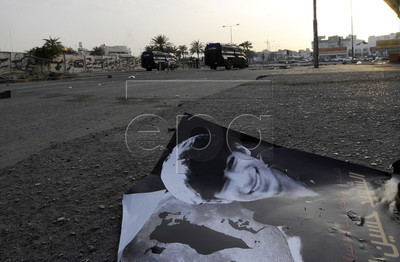
Clashes disrupt memorial service for slain Bahrain teenager
20 February, 2013 – The Daily Star
MANAMA: Protesters clashed with Bahraini police Tuesday at a memorial service for a teenager killed last week in demonstrations marking the second anniversary of a Shiite-led uprising, witnesses said.
Police fired tear gas and stun grenades to disperse hundreds of people who gathered in the Shiite-populated village of Daih, near Manama, to pay tribute to Hussein al-Jaziri.
The 16-year-old was killed in Daih Thursday as rallies were staged on the anniversary of the start of the uprising on Feb. 14, 2011. A policeman was also killed on the same day at Al-Sahla village, also near the capital.
Protesters called Tuesday for the ouster of Bahrain’s king, shouting “Down Hamad,” witnesses said.
The Interior Ministry, in a message posted on Twitter, said security forces dispersed “saboteurs” who had briefly blocked traffic on a road near Manama after the memorial service.
Clashes broke out Saturday at the funeral of Jaziri with police also using tear gas against mourners, witnesses had said.
Jaziri died after being shot in the stomach by security forces, according to Al-Wefaq, the main Shiite opposition bloc, during Shiite-led protests against the kingdom’s Sunni rulers.
The policeman died after he was hit by a Molotov cocktail during clashes in Al-Sahla, the Interior Ministry said.
Tuesday’s unrest came as two Sunni factions said they were suspending participation in talks with Shiite opposition groups due to a spike in violence.
Al-Saff Al-Islami and Al-Minbar Al-Islami said they were boycotting Wednesday’s session to protest the “silence” of the opposition following the latest violence.
Bahrain has seen two years of political upheaval linked to opposition demands for a real constitutional monarchy.
February 20, 2013 No Comments
US Still Acquiescing in Bahraini Crackdown
US Still Acquiescing in Bahraini Crackdown
by Amitabh Pal – Common Dreams
Two years ago this week, the Bahraini monarchy started cracking down on its people. It’s still at it, with the complicity of the Obama Administration.
On February 14, 2011, Bahrainis embarked on their version of the Arab Spring, running up against official repression immediately. The protests so unnerved the regime that it called upon the Saudis to invade the country. The Saudis did so a month later with the acquiescence, at least, of the Obama Administration, and a long night descended upon the island nation.
Dozens of protesters have been killed at the hands of the security forces over the past two years. Hundreds are in jail. Just last month, the Bahraini appeals court confirmed life sentences for seven prominent activists, including Abdulhadi al-Khawaja, who had staged a long hunger strike in protest against his mistreatment.
Over the past year, “the government shifted from talking about reforms to silencing critical voices, banning demonstrations, and restricting access to independent journalists and rights organizations,” Human Rights Watch Deputy Middle East Director Joe Stork recently stated. “These actions thoroughly discredit claims by Bahraini authorities of respecting human rights.”
The demonstrators persevere.
“Protests have taken place every day for the past few weeks,” reports Reese Erlich (a contributor to The Progressive) for NPR. “A group of six traditional opposition parties, headed by the Al Wefaq National Islamic Society, continue to mobilize the largest numbers. But the February 14 Youth Coalition has challenged those parties with more radical demands and militant tactics.”
And the toll continues to rise.
“In Bahrain, a teenage boy has been killed by security forces during protests marking the second anniversary of the country’s pro-democracy uprising,” Democracy Now reports. “Opposition activists said Hussain al-Jaziri died from shotgun wounds. At least eighty-seven people have died at the hands of security forces in the Gulf nation since 2011.”
The United States has played a hypocritical and pernicious role here. A mix of security considerations, Iranophobia, and oil has put the Obama team on the wrong side of democracy. The U.S. Fifth Fleet is stationed in Bahrain. The uprising has acquired a sectarian hue for some due to the Shiite majority confronting the Sunni monarchy. Shiite Iran has been accused (with scant evidence) of fishing in troubled waters. And the United States believes it can’t afford to alienate such a crucial supplier of oil as Saudi Arabia. Hence, its response to the Bahraini crackdown has been coldhearted.
“Even the most basic steps that were taken against other governments during these mass uprisings that the Middle East and North Africa region has witnessed, we haven’t seen those steps taken towards Bahrain,” activist Maryam al-Khawaja (daughter of Abdulhadi al-Khawaja) tells Democracy Now. “We’ve been seeing the selling of arms to Bahrain by the United States and the United Kingdom and others, ongoing business as usual when it comes to economic deals and so on—all in the name of security.”
The cozying up to the Bahraini monarchy seems to be a bipartisan venture. “Met w/ #Bahrain’s King Hamad bin Isa al-Khalifa this weekend,” Senator John McCain tweeted in December.
In all the tumult, Bahraini women have been in the forefront of the uprising.
“I watched one woman singlehandedly organize activities for traumatized children of martyrs and prisoners,” Jen Marlowe wrote in the November issue of The Progressive. “I accompanied two female doctors from Physicians for Human Rights as they went from house to house, documenting the long-term affects of continuous exposure to tear gas. I stood next to a fearless young woman who photographed riot police attacking protestors with tear gas. I interviewed a defiant female university student just hours after her release from prison, where she had been sexually abused.”
Last month, thirty human rights organizations from around the world sent a letter to President Obama urging him to apply pressure to get pro-democracy campaigners released.
“Dear Mr. President,” the letter reads, “The Gulf Center for Human Rights (GCHR) and the Bahrain Center for Human Rights (BCHR), as well as the undersigned human rights organizations, call on you to take substantive action towards securing the immediate release of thirteen activists and human rights defenders who are arbitrarily detained in Bahrain.”
Obama needs to heed their plea, instead of coddling a repressive monarchy. …source
February 19, 2013 No Comments

